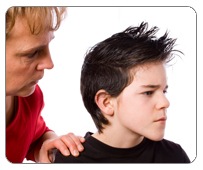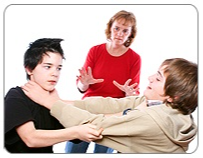Tips for Parents
Do you want to be a better parent? Do you have a child with emotional problems, discipline issues, or academic issues? Please see the links below for articles on how to deal with many different parenting issues. (empoweringparents.com)
Articles by James Lehman

Parenting Teens: Parental Authority vs. Peer Pressure
It’s one of the hardest things parents deal with: even if you’re trying to raise your child the right way, as soon as he walks out the door, you know he’s going to be exposed to all sorts of negative—even dangerous—influences. From dress to attitude to a popular culture that says it’s cool to drink and do drugs, parents have every right to be concerned. Are you afraid to send your child out the door? In this insightful one–on–one interview, James Lehman gives you some honest advice. Read More

Do You Feel Like Your Child's Behavior is Your Fault?
When you’re the parent of an acting-out child, it’s easy to feel as if you’re to blame for their behavior. As a result, you can fall into the trap of trying to fix things for your child instead of letting them deal with the natural and logical consequences of their behavior. In this interview, James Lehman explains some of the ineffective roles parents fall into, and tells you why it’s important to identify what you’re doing so you can change—and help your child change, too. Read More

udeness and Disrespect: How Kids Try to "Defuse" It
“I was just kidding! Can’t you take a joke?” If your child gives you this excuse after he’s said or done something rude, it might leave you feeling frustrated and unsure of how to handle the situation. Later, you might question yourself when he says, “But I didn’t mean it that way.” In this article, James Lehman explains why disrespect and inappropriate behavior are really nothing to laugh at—no matter what the excuse. Read More

Consistent Parenting: How to Unlock the Secret
"Being consistent is the hardest thing of all," many parents tell us. And it’s so true—it’s easy to lay down a rule and then let it slide when you’re tired or in a hurry. In this article, James Lehman explains why consistency is the key to your child’s behavior—and tells you ways to keep on track when you feel like giving up. Read More

Why Child Counseling Doesn't Always Work
Have you sent your acting-out, verbally abusive or behaviorally-disordered child to counseling, only to find that it didn’t improve his behavior at all? Or maybe counseling worked for awhile, but then your child fell back into the same old patterns of behavior. Counseling for kids can be effective and helpful, but not all counseling is the same. We sat down with James Lehman to hear what he had to say about finding the right type of counseling for your child—and the kind of training parents need to become the “agents of change” in their families. Read More

Why You Should Let Your Child Fail: The Benefits of Natural Consequences
Watching your child fail makes you feel helpless, angry and sad. You worry about everything from your child’s self-esteem and social development to their future success. James Lehman explains that while it’s natural for parents to worry about failure, there are times when it can be productive for kids—and a chance for them to change. Read More

Setting Limits with Difficult Kids: How to Get Them to Listen
How many times has this happened to you? You set a limit on behavior, and your kids ask, “Why?” or ignore your limits entirely. Or perhaps it’s a war of inches—your adolescent tests you by coming in a few minutes later past curfew each time he goes out. Then he accuses you of being petty when you enforce the limit with a consequence. No matter the method, it’s infuriating for parents when their kids push against the structure they set. And for some parents, it’s hard to limit their child’s behavior in the first place. How can you set limits effectively and get your kids to listen? James Lehman explains how in this article. Read More

Sassy Kids: How to Deal with a Mouthy Child
Are you tired of disrespectful talk from your kids? Do your children respond with eye-rolling and sarcasm to everything you say? Most—if not all—kids go through phases when they are sassy, mouthy, or disrespectful. As a parent, it’s hard to know when to let it slide—and when to address the problem. James Lehman explains where to draw the line—and tells you how you can manage sassy talk in your home. Read More

Is It Time to Call the Police on Your Child? Assaultive Behavior, Verbal or Physical Abuse, Drugs and Crime
There are times when your authority as a parent isn’t enough. If your adolescent has escalated to the point of physical abuse and destruction of property—or if he is engaging in risky or dangerous behavior outside the house—you already know you need help. Calling the police on your child poses a risk that you might not be willing to take, but it’s an option you might want to consider. James Lehman tackles this tough subject in a frank one-on-one interview. Read More

It's Never Too Late: 7 Ways to Start Parenting More Effectively
Many parents write in to Empowering Parents and ask, “Is it too late to change the way I parent my child—and will it actually work if I do?” In this article, James Lehman explains how you can change the way you parent, and why your child’s behavior has a much better chance of improving when you do. James gives you 7 ways to be a more effective parent, starting today. Read More

Aggressive Child Behavior Part II: 7 Tools to Stop Fighting in School and at Home
In part 2 of this two-part series, James discusses exactly what to do when your children get in trouble for fighting at school or at home—and the right kinds of consequences to give them so they learn to use appropriate behavior instead of lashing out when they feel like hitting someone the next time. Read on to find out the steps you can take toward resolving the problem of fighting at school, plus get advice on how to handle fights that break out between siblings at home! Read More

Aggressive Child Behavior Part I: Fighting in School and at Home
Does your child always seem to get in trouble for fighting? You’ve tried talking to him, but the aggressive behavior hasn’t stopped—he still roughhouses with his siblings at home to the point of injury, brawls with kids on the bus and gets into fistfights at school. In part 1 of this two-part series on aggressive child and teen behavior, James Lehman explains why kids get into fights in the first place—and tells you the three basic types of fighting that you need to address as a parent. Read More

The Secret to Understanding Acting-Out Behavior: 5 Common Thinking Errors Kids Make
Does your child refuse to take responsibility for everything? Or maybe your teen plays the victim card and is a pro at turning around an argument so you feel like you’re the one to blame. What you probably don’t realize is your child is using “thinking errors” to get his way—and to get out of doing things. In this follow-up to the recent article in EP on “Child Outbursts," James Lehman unlocks the mystery of your child’s excuse-making, blaming and fighting. Read More

Passive-Aggressive Child Behavior: Hidden Anger in Kids
Does your child take forever to get up, eat breakfast and do his homework and chores? You nag, threaten and repeat yourself, but he still doesn’t seem to pay attention to anything you say. Here, James Lehman explains the passive-aggressive ways kids control you—and how they use it to avoid responsibility. Read More

Child Outbursts: Why Kids Blame, Make Excuses and Fight When You Challenge Their Behavior
Arguing with kids often seems like a losing battle—and it is. No matter what you say, your child has a smart comeback that pushes your buttons or leaves you speechless. And worst of all, when your child is angry, nothing is fair, and it’s never his fault. James Lehman explains how, in any argument, your child might set different “traps” for you to fall into. Once you know what these traps are, you’ll be able to avoid them—and hold your child accountable. Here, James translates what your child is really saying during an argument. Read More

Kids Who Ignore Consequences: 10 Ways to Make Them Stick
Does your child ignore every consequence you give him? This week, James Lehman gives you 10 specific ways to make consequences work—even for the most resistant child. Read More

Is It an Adolescent Phase or Out-of-Control Behavior? Part II: 8 Ways to Manage Acting-out Kids
In part two of this series, James discusses eight ways to challenge acting out behavior in kids today—from disrespect to breaking curfew to alcohol and substance abuse—in order to start changing your child’s behavior tomorrow. Read More

Is It an Adolescent Phaseor Out-of-Control Behavior?
“Every teen goes through this!” You tell yourself these words, but in the back of your mind, you wonder if your child’s disrespect, acting out and destructive behavior really is normal. How do you know if your child is going through an adolescent phase, or if his out-of-control behavior is here to stay? James Lehman has the answer in Part 1 of this 2-part series in Empowering Parents. Read More

Sinking Fast at School: How to Help Your Child Stay Afloat
Is your child failing in school? Maybe he started out full of enthusiasm, but now his grades are slipping, his attitude is bad and he seems to be falling through the cracks. If your child has hit a slump midway through the school year, you are not alone. James Lehman has some advice for you today on what you can do now to get your child back on track. Read More

Your Child is Not Your Equal: Why You Have to Be the Boss
As a parent, if you aren’t the boss in your family, the lines of authority can become blurred very quickly. When your children are unsure about who’s really in charge, they often act out, engage in risky behavior, or become extremely bossy and patronizing as a result. And eventually you start to resent them because you don’t have a way to tell them what to do. You’ve effectively lost control. Read More
Tips for Parents
Hosting a Teen Party
The following information has been put out through the KYDS Coalition: Keeping Youth Drug-Free and Safe Drug-Free Action Alliance.
If your teen is having a party:
• Help your teenager plan the party. Make a guest list and invite only a specific number of people.
• Have your child pass out or send invitations and try to avoid the “open party” situation.
• Don’t send e-mail invitations. They can be forwarded to a large number of people quickly and you lose control of who has this information.
• Put your phone number on the invitation and welcome calls from parents.
• Set rules ahead of time such as no alcohol, drugs or tobacco. Set a start and end time for the party.
• Let attendees know that if they leave, they can’t come back.
• Have plenty of food and non-alcoholic beverages.
• Plan some activities such as music, games, movies, etc.
• Let your neighbors know in advance there will be a party and that you will be there to supervise. Familiarize yourself with the noise ordinance in your area.
• Limit the party access to a certain area of the house/property.
• Have a plan for dealing with vehicles. Include parking information on your party invitation.
• Call parents of any teen who arrives in possession of alcohol or under the influence. If you can’t get in touch with the parents, keep the teen there or call the police if necessary. You can be civilly liable if you know they have been drinking and you let them leave.
• Secure all forms of alcohol, firearms and other potentially hazardous items in your home in a safe place.
• Make regular and unobtrusive visits to the party area with sensitivity to teens’ needs for privacy and independence.
• Invite some other parents to help chaperone if there will be a large number of teenagers.
When you’re away from home or out of town:
• Set and communicate rules and standards to be followed in your absence.
• Do not allow underage youth to have unsupervised parties or gatherings.
• Remind them of their responsibilities and the consequences of their actions.
• Have a relative or responsible adult stay at your home during your absence, have your teenager stay with a responsible adult or ask a neighbor to watch the house and stop in while you are gone.
• If you are concerned that your child might have a party anyway, you can call your local police and ask them to drive by at some point over the time you are gone. Make it a point to tell your child that you have asked the police to do this.
If your teen is attending a party:
• Know where your child will be. Call the parent in charge to verify the occasion and location of the party and ensure there will be adult supervision.
• Ask how many teens are expected at the party and offer to help supervise or provide refreshments.
• Make certain that the host will not be serving or allowing alcohol. Ask how they plan to handle the situation if a teen shows up with alcohol or has been drinking.
• Indicate your expectations to your child and the parent hosting the party that if the teens leave and go somewhere else, you will want to know.
• Set a curfew for your teen to be home and when they arrive home, have them check in with you.
• Know how your child is getting to and from the party. Reinforce the message to your teenager that they should never allow someone who has been drinking or using other drugs to drive them anywhere.
• Assure your child that they can telephone you to be picked up whenever needed.
• If the activity seems inappropriate, express concern and keep your child home.
Other ideas:
• Get to know your children’s friends and their parents.
• Find out their policy on alcohol, drug and tobacco use.
• Remember, it is illegal to serve minors, or to knowingly allow a minor to have alcohol on your property.
• Encourage alcohol-free and drug-free parties and activities for underage youth.
